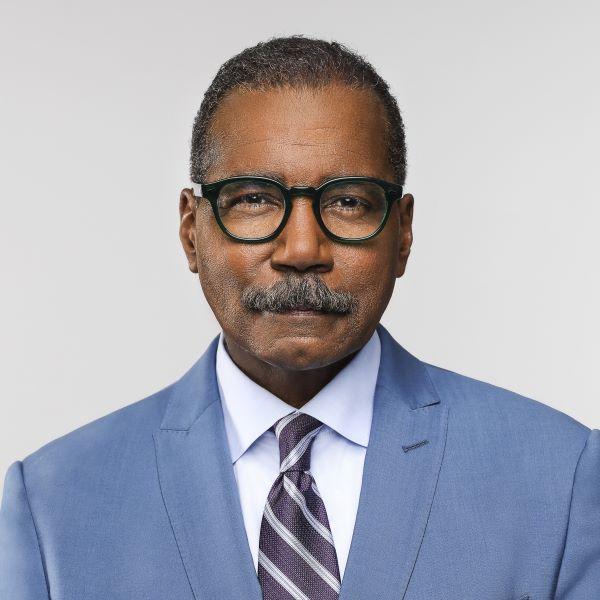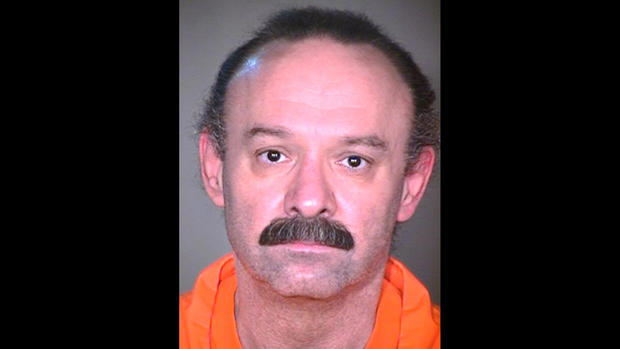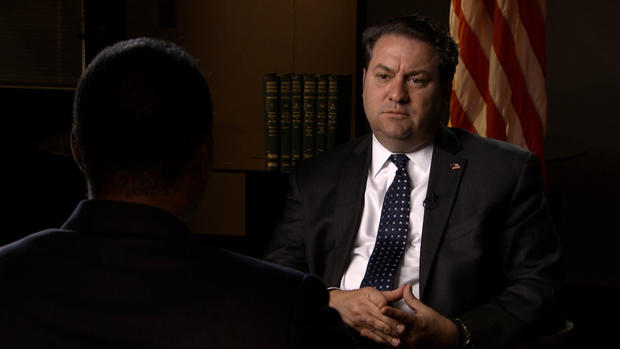The Execution of Joseph Wood
The following is a script from "The Execution of Joseph Wood" which aired on Nov. 29, 2015, and was rebroadcast on July 10, 2016. Bill Whitaker is the correspondent. Ira Rosen and Habiba Nosheen, producers.
In July of 2014, Joseph Wood was strapped to a gurney in Arizona's death chamber. His execution, by lethal injection with a new cocktail of drugs was supposed to take about 10 minutes. It took almost two hours -- the longest execution in U.S. history.
As we first reported in November, when lethal injections were introduced in 1977, they were supposed to be a more humane form of capital punishment. Instead the process has become a messy testing ground for unproven, toxic drugs.
At the heart of the problem: pharmaceutical companies have banned the use of their drugs for capital punishment -- partly under pressure from death-penalty opponents. Without access to the lethal agents they've used for decades, the states are turning to new, untried drugs.
And that's creating an execution crisis in America, making it harder and harder to ensure that when a state decides to end a life, things don't go horribly awry, as they did in the execution of Joseph Wood.
Arizona is one of 31 states to employ capital punishment. Cameras aren't allowed here, but this Department of Corrections video takes us inside Death Row, where more than 100 inmates are awaiting execution by lethal injection.
On July 23, 2014, it was Joseph Wood's turn. Wood had been convicted of murdering his former girlfriend and her father.
At 1:52 p.m., Arizona executioners began pumping an experimental combination of drugs into Wood's veins. They had never before used these drugs for execution, but they expected Wood to die within minutes.
Among the witnesses that day were Deacon Ed Schaeffer, Wood's attorney Dale Baich, and reporter Michael Kiefer.
Michael Kiefer: It seemed to go as normal. They put in the catheters. They announced that they would-- were administering the drug. And he closed his eyes and went to sleep.
Dale Baich: And about 11 minutes in, I noticed his lip quiver. And a minute later, he gasped. A few seconds later, he did it again and then again and again and again.
Ed Schaeffer: It was loud. It wasn't just, you know, some nice, peaceful sleeping sound.
Bill Whitaker: Were you thinking at this point, "Something's gone wrong"?
Michael Kiefer: Everybody was thinking something went wrong. You could see the looks on the faces of the people from the Department of Corrections, who were standing along the side. You know, they were looking at each other nervously.
Bill Whitaker: You tried to have the execution stopped?
Dale Baich: While Joe Wood was on the table gasping and gulping, we were arguing to a federal judge that he should stop the execution.
Bill Whitaker: On what grounds?
Dale Baich: That it wasn't working.
Ed Schaeffer: I actually said about four rosaries, four complete rosaries, and there's five decades to each rosary. And each one can take anywhere from 15 to 20 minutes.
Bill Whitaker: And that told you that this was going on for a very long time?
Ed Schaeffer: Hour and 58 minutes.
Michael Kiefer: That's a long time to be sitting there, watching somebody die.
Before the federal judge could rule, Joseph Wood was dead. It was supposed to take just one dose of the drugs to kill him. Prison logs show before it was over executioners had injected Wood 15 times with the new cocktail of drugs.
Dale Baich: Someone made the decision to inject 14 additional doses of that drug into Mr. Wood. That's not something that has ever been done before. So, they were making it up as they went along.
In several rulings, the Supreme Court has reaffirmed the Eighth Amendment: punishment must not be cruel and unusual. Joseph Wood's lingering death set off alarms across the country and prompted an independent investigation in Arizona.
Bill Whitaker: Was Joseph Wood's execution botched?
Mark Brnovich: Well, Bill, I think "botched" is a very inflammatory word.
Arizona Attorney General Mark Brnovich told us he sees nothing wrong in the way Wood's execution was carried out.
Bill Whitaker: It took almost two hours. That's the longest execution in U.S. history?
Mark Brnovich: At the end of the day, though, the independent report, the medical examiner, all concluded that Mr. Wood was sedated the entire time, was unresponsive to stimuli, and he was feeling no pain whatsoever.
Bill Whitaker: But, how do you know that?
Mark Brnovich: Well, obviously--
Bill Whitaker: Were--
Mark Brnovich: At the end of the day--
Bill Whitaker: --there sensors? Was anybody taking brain s-- you know, how do you know he wasn't feeling--
Mark Brnovich: Well--
Bill Whitaker: --pain?
Mark Brnovich: Ultimately, you can't know, because the person's dead.
Bill Whitaker: So if two hours isn't too long, what is? Three hours? Would that cause alarm? Four hours?
Mark Brnovich: I think two hours, three hours, four hours, when someone's on the death gurney and they're unconscious, I don't think they're worried about the time. In this instance it happened to take longer but that does not mean that it was botched.
Bill Whitaker: What should you call it?
Mark Brnovich: I would call it that you had somebody who is a heinous killer that murdered people in cold blood and eventually received justice.
There's no dispute of Joseph Wood's guilt. In August of 1989, Wood, a 31-year-old vet, addicted to methamphetamines, walked into this auto body shop in Tucson, Arizona, shot and killed his former girlfriend, Debra Dietz, and her father, Eugene Dietz, in cold blood, in broad daylight. Richard and Jeannie Brown remember that day well.
Bill Whitaker: You actually saw Joe Wood kill your--
Richard Brown: Sister-in-law. She's saying "No, Joe, don't do it, don't do it" and he shot her anyways. It was one of the worst days of my life. In 40 seconds, Eugene Dietz and Debra Dietz were dead.
Jeannie Brown: And my mom looked at me and she walked up and gave me a hug and she said, "Your dad and your sister were just killed."
Bill Whitaker: You witnessed his execution?
Richard Brown: Yes.
Bill Whitaker: What was that day like for you?
Richard Brown: That day was one of the best days of my life, because he finally got it.
Jeannie Brown: Everybody can say he went inhumanely, it was a horrible death, I wonder if we were all sitting in the same room and if we all saw the same thing, because he went peacefully. And my-- I'm sure my dad and my sister did not go peacefully.
Bill Whitaker: This is a murderer. He committed a heinous crime. Why worry about his last two hours on earth?
Dale Baich: We're not medical doctors. We don't know whether Joe Wood experienced pain. But what we do know is that under the Constitution there cannot be cruel and unusual punishment. And there cannot be a lingering death. I witnessed other executions by lethal injection and I had never seen anything like that.
Lethal injections were supposed to be a civilized step up from the brutality of electrocutions and the spectacle of public hangings. Former President Ronald Reagan described execution by lethal injection as just like falling asleep.
Alex Kozinski: I just think that the whole idea of using drugs is foolish.
Alex Kozinski is a judge on the United States Court of Appeals for the Ninth Circuit which covers the West -- including Arizona, where Joseph Wood was executed. Kozinski was appointed to the bench by President Reagan and is one of the most prominent conservative judges in the country. He is in favor of the death penalty but is opposed to lethal injection.
Alex Kozinski: The state of Arizona and other states want to make this look like it's benign, want to make it look like "Oh, it's just a medical procedure." They ought to just face the idea that this is cruel and this is violent. And they ought to use some method that reflects that.
Bill Whitaker: Well, we used to do all kinds of things to kill people. We used to have the electric chair. We used to have the gas chamber. We used to hang people, even publicly.
Alex Kozinski: Many people were executed by electric chair but then it was switched away from that because it was thought to be something that caused pain.
Bill Whitaker: So, that's why most states moved to lethal injection.
Alex Kozinski: And as a result, those people who strongly opposed the death penalty moved to stop the flow of drugs that are available for execution. So now states have to scramble for ever-more-exotic drugs to try to carry out the death penalty.
Pharmaceutical companies also grew alarmed that drugs developed to heal were being used to kill and they refused to sell them for use in executions. The U.S. government now prohibits the import of the drugs. We found 15 states have begun to improvise their own lethal concoctions. The result: a number of bungled executions.
In 2014, in Ohio, convicted murderer Dennis McGuire gasped and convulsed on the gurney for 25 minutes before dying. In Oklahoma, Clayton Lockett, convicted of rape and murder, was administered an untested combination of drugs. He struggled violently, groaned and writhed. A witness later said it was like watching a person being tortured to death. Prison officials moved to stop the execution, but Lockett would die of a heart attack 43 minutes after the drugs first entered his veins. Lockett's execution prompted President Barack Obama to call for a wide-ranging federal review of executions.
President Barack Obama: What happened in Oklahoma is deeply troubling. In the application of the death penalty in this country we have seen significant problems.
Most states have laws making lethal injection the only option for executions. With the drugs now unavailable, we have found six states have skirted federal law and turned to black-market dealers to get their hands on them.
Six years ago, when Arizona needed drugs to execute an inmate named Jeffrey Landrigan, it purchased them illegally from a supplier operating out of this driving school in London. On customs forms obtained by 60 Minutes, the state claimed the imported drugs were for animal use. We asked the current attorney general, Mark Brnovich, if those drugs were used for the Landrigan execution.
Bill Whitaker: The importing of the drug that you were trying to use for his execution was illegal. It's against U.S. law for that drug to be imported.
Mark Brnovich: It's my understanding that there was a paperwork issue. The proper forms weren't filled out.
Bill Whitaker: Was it used in the execution of Mr. Landrigan?
Mark Brnovich: Yes.
Bill Whitaker: This office, the state of Arizona, knew or should have known that it was illegal to import these drugs.
Mark Brnovich: Bill, I was not the attorney general when that happened--
Bill Whitaker: Yeah, but this--
Mark Brnovich: And I don't want to use that as an excuse. 'Cause I think there's--
Bill Whitaker: But if this office--
Mark Brnovich: --a broader--
Bill Whitaker: --is-- this-- this is the top legal office.
Mark Brnovich: Right. And all I can assure you is that as long as I'm attorney general, we will follow all state and federal regulations and all state and federal laws when it comes to obtaining and using the drugs in the executions here in Arizona.
After our interview, newly-released documents revealed the Arizona Department of Corrections once again purchased banned execution drugs abroad. Federal authorities seized the illegal imports. Arizona now is trying to get them back.
Mark Brnovich: We execute individuals not because we want to or we get some sort a bloodlust out if it. We do it because we feel like we have to. And we will do everything we can to make sure that they're killed in the most efficient manner possible.
The death penalty in Arizona has been blocked by a lawsuit since the problems with Joseph Wood's execution. The state is fighting in court to resume capital punishment by lethal injection.
Alex Kozinski: I would eliminate the entire controversy. I would use a bullet or a series of bullets. They're fast. They're effective. Nobody ever survives.
"The death penalty is barbaric. And I think we as a society need to come face-to-face with that. If we're not willing to face up to the cruelty, we ought not to be doing it."
Bill Whitaker: Go back to the firing squad?
Alex Kozinski: Make it look like an execution. Mutilate the body. And this would express the sense of that's what you're doing, that we're actually committing violence on another human being.
Bill Whitaker: I read that you have even thought the guillotine might be a good way to execute.
Alex Kozinski: Oh, yes.
Bill Whitaker: Really?
Alex Kozinski: The guillotine works. Never fails. It's quick. It's effective.
Bill Whitaker: You do know what that sounds like, hearing a judge sort of be an advocate for the guillotine?
Alex Kozinski: Tell me.
Bill Whitaker: Barbaric.
Alex Kozinski: The death penalty is barbaric. And I think we as a society need to come face-to-face with that. If we're not willing to face up to the cruelty, we ought not to be doing it.



